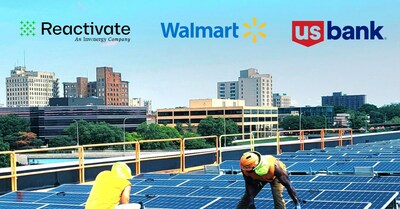CHICAGO, Jan. 31, 2024 /PRNewswire/ -- A new portfolio of seven community solar projects in Illinois and New York will help approximately 5,000 households, along with area non-profits, businesses, and a public school district, save as much as 20% on their monthly electricity costs. Reactivate (an Invenergy company), a mission-driven renewable energy company, in collaboration with Walmart and U.S. Bancorp Impact Finance (a U.S. Bank subsidiary) recently closed a tax equity transaction on the new portfolio. Once the projects are placed in service, the beneficiaries will include a significant majority of Low-to-Moderate Income (LMI) households; the remaining savings will be realized by public schools, a municipality, non-LMI households, and various private organizations, including two affordable housing providers, a community recreation center, religious institutions, and a housing association.

For Walmart, this is a key example of how the retailer is ramping up its energy transformation strategy by investing in projects that focus on making access to clean energy affordable, reliable, and equitable – and in line with Walmart's goal to bring at least 2GW of community solar projects in service by the end of 2030. "Serving our customers and communities is core to our purpose at Walmart and our support of this high-impact portfolio demonstrates our continued commitment to that purpose. These projects will assist in building a stronger and cleaner grid, expand access to clean energy for underserved communities and help people save money on their utility bills," said Frank Palladino, Vice President, Renewable Energy Strategy at Walmart.
"This partnership with Walmart and U.S. Bank combines environmental stewardship with social responsibility, delivering tangible benefits to low-to-moderate income and energy transition communities while achieving clean energy goals", said Chris King, EVP of Finance at Reactivate. "We remain committed to driving positive change and reshaping the landscape of renewable energy investment," said Utopia Hill, CEO of Reactivate.
The transaction supports a portfolio of seven community solar projects across Illinois and New York, boasting a combined capacity of 14.4 megawatts (AC) which are estimated to avert 667,788 metric tons of CO2 emissions — equivalent to eliminating 748 million pounds of coal burned — over the projects' lifespans. The six Illinois community solar projects are located in Chicago Heights, Ford Heights, Monee, Granite City, and Rockford and will serve qualifying customers of ComEd and Ameren. The New York solar project is located in Oswego County and will serve qualifying customers of National Grid.
Community solar allows customers to realize the financial benefits of clean energy without owning a property or the upfront costs for solar. For renters, LMI households, and many local businesses in states with community solar programs, community solar is one of the few zero-upfront-cost options for saving money on electricity bills. According to DOE's Low-Income Energy Affordability Data Tool, the national average energy burden for low-income households is 8.6%, three times higher than for non-low-income households. In some areas, depending on location and income, energy burden can be as high as 30%. Of all U.S. households, 44%, or about 50 million, are defined as low-income.
"Projects like Reactivate's are shining examples of how renewable energy developers can distribute the direct benefits of grid-decarbonization to historically underserved communities," said Clark Conlisk, U.S. Bancorp Impact Finance - Vice President, Assistant Director of Project Management & Impact Capital, who is part of the Environmental Finance team of U.S. Bancorp Impact Finance. "For the LMI households subscribed to the project, the money that no longer must be spent to keep on the lights and A/C is a benefit to real people and empowers them to spend or save as they choose. U.S. Bank is fortunate to be able to support Reactivate's vision for an inclusive and equitable clean energy economy while advancing our own clean energy and equity goals."
Reactivate's portfolio will serve approximately 5,000 households to benefit from the electricity cost savings delivered by these projects, approximately 90% of which will qualify as LMI. LMI customers in Illinois and New York will receive a minimum 20% reduction on their retail electricity costs, up to the amount of their subscription to project output. Total customer savings from the projects in this investment are projected to exceed $17 million over the projects' lifespans.
About Reactivate
Reactivate is a mission-driven renewable energy company, that develops, owns, and operates renewable energy projects to improve the lives of people in low-to-moderate income and energy transition communities across the country. Reactivate's primary focus areas are community solar, commercial & industrial solar, small utility scale solar, energy storage, and EV charging projects. Reactivate creates positive social and environmental impact in underserved communities by delivering renewable energy, environmental benefits, job opportunities, energy cost savings and opportunities for minority and women-owned businesses. Reactivate was founded by Invenergy and Lafayette Square.
About Walmart
Walmart Inc. (NYSE: WMT) is a people-led, tech-powered omnichannel retailer helping people save money and live better – anytime and anywhere – in stores, online, and through their mobile devices. Each week, approximately 240 million customers and members visit approximately 10,500 stores and numerous eCommerce websites in 19 countries. With fiscal year 2023 revenue of $611 billion, Walmart employs approximately 2.1 million associates worldwide. Walmart continues to be a leader in sustainability, corporate philanthropy, and employment opportunity. Additional information about Walmart can be found by visiting https://corporate.walmart.com, on Facebook at https://facebook.com/walmart, on X (formerly known as Twitter) at https://twitter.com/walmart, and on LinkedIn at https://www.linkedin.com/company/walmart/.
About U.S. Bancorp Impact Finance
U.S. Bancorp Impact Finance, a subsidiary of U.S. Bank, is an industry leader in providing financial solutions that help create positive impact for communities and the environment. For 35 years, its tax credit investments and syndications, lending and other financial solutions have helped create affordable housing, spur economic activity in underserved communities, restore historic buildings, develop renewable sources of energy, and strengthen community development financial institutions (CDFIs) nationwide. Learn more at usbank.com/impactfinance.
 View original content to download multimedia:https://www.prnewswire.com/news-releases/reactivate-launches-new-community-solar-portfolio-with-walmart-and-us-bank-in-low-to-moderate-income-communities-302049543.html
View original content to download multimedia:https://www.prnewswire.com/news-releases/reactivate-launches-new-community-solar-portfolio-with-walmart-and-us-bank-in-low-to-moderate-income-communities-302049543.html
SOURCE Reactivate
![]() View original content to download multimedia:https://www.prnewswire.com/news-releases/reactivate-launches-new-community-solar-portfolio-with-walmart-and-us-bank-in-low-to-moderate-income-communities-302049543.html
View original content to download multimedia:https://www.prnewswire.com/news-releases/reactivate-launches-new-community-solar-portfolio-with-walmart-and-us-bank-in-low-to-moderate-income-communities-302049543.html








